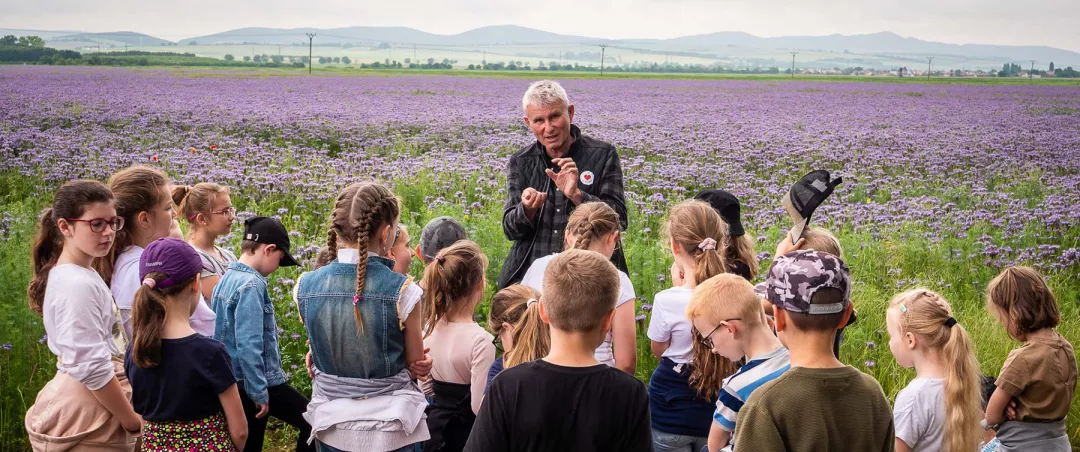Inspirational idea: agricultural cooperative in Slovakia applies regenerative farming to restore soil health and productivity
- Innovation, knowledge exchange & EIP-AGRI
- Agricultural Productivity
- Environment
- Fostering Knowledge & Innovation
Regenerative practices have helped a cooperative to save input costs and reduce soil erosion.

Regenerative agriculture is an approach to farming and land management that focuses on restoring and enhancing the health of ecosystems while promoting sustainable food production. With more than 60% of EU soils currently considered unhealthy due to current management practices, pollution, urbanisation, and the effects of climate change (EU Soil Observatory), regenerative agriculture can be used to sustain yields on a long-term basis without negatively impacting the soil and minimal dependence on agrochemicals.
Following a change of management in 2010, Krakovany-Stráže, an agricultural cooperative in Slovakia, has been gradually introducing regenerative agricultural practices to restore and maintain soil health and productivity. The cooperative has 54 shareholders and 640 hectares of farmland.
Before beginning with regenerative practices and after many years of intensive farming and chemical treatment, sustainable management was difficult. Robert Dohál, the chairman of the board of directors, mentions: “After tens of years of conventional farming, the soil was not in good condition and the farm was working at a loss. As a way to regenerate the economy of Krakovany-Stráže, we decided to experiment with regenerative agriculture.”
The adoption of the practices was gradual. They began reducing tillage of the soil and use of machinery on the fields; a few years later, they introduced cover crops, and in 2016, they switched to no-till, directly sowing into the remains of the pre-crop or cover crop. The cooperative stopped using fungicides, insecticides and artificial fertilisers. Today they apply organic fertilisers and compost only on the surface of the soil. They have also planted flower strips. Robert explains: “In regenerative farming, we want to imitate the way nature works. Allowing all biological processes to take place naturally in the soil, bringing life back to the soil and making our farm innovative thanks to it.”
A large variety of crops are grown by the agricultural cooperative, this is key for many of the practices, promoting diversity and preventing pests and diseases. Last year, the main crops were peas, durum wheat and maize, and on the remaining 40% of the land, they grew 11 others, including vetch, poppy, rapeseed, buckwheat, rye, barley and phacelia. Krakovany-Stráže is currently running field trials for rapeseed and experimenting with practices that do not use insecticides and fungicides. Species and combinations of cover crops are also being constantly studied and improved.
Regenerative practices have helped Krakovany-Stráže to save input costs and eliminate soil erosion. The environmental element was also important. Robert Dohál explains: “We manage the soil gently, in harmony with nature, with natural resources, with respect for Mother Earth. In regenerative farming, the soil is not disturbed by anything and the soil is covered by plants or plant residues all year round.”
The application of regenerative agriculture practices has had many benefits for the cooperative. Organic carbon content in the soils has increased, in some fields from 1.7% in 2013 to 2.6% in 2021. The amount of carbon sequestered has also gone up and there has been no soil erosion in the past 12 years. A study in 2021 showed that water retention capacity was 100 litres per m² per year higher in their soils than in surrounding agricultural land. Input costs significantly lowered while yields have been maintained to match the local average. This has had a fundamental impact on the economic stability, and the cooperative has been consistently producing a profit for the past five years. Biodiversity has also increased, supporting beekeepers by providing bee pastures throughout the season. To improve soil health even further, the cooperative now aims to progressively reduce the application of herbicides.
The cooperative regularly shares its experiences, celebrating soil health and promoting education about regenerative farming. They welcome school visits and organise information days.
Robert Dohál concludes: “Agriculture is not, and must not be a business based on the plundering of resources! They are not inexhaustible. Let's change it! Let's start farming and teach with a clear conscience.”
Background information
Project contact: Ján Hegyi – Jankohegyi@gmail.com – +421915783005
Krakovany-Stráže is participating in EU project PREPSOIL as a Community of Practice. The PREPSOIL project facilitates the deployment of 'A Soil Deal for Europe' EU mission across European regions by helping key players reduce soil degradation, while increasing soil awareness and literacy.
